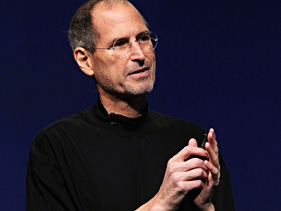Apple co-founder was diagnosed with pancreatic cancer in 2004. By Katie Byrne Steve Jobs Photo: Getty Images Apple announced Wednesday (October 5) that co-founder Steve Jobs had died at age 56. “Apple has lost a visionary and creative genius, and the world has lost an amazing human being,” read a statement posted on Apple.com . “Those of us who have been fortunate enough to know and work with Steve have lost a dear friend and an inspiring mentor. Steve leaves behind a company that only he could have built, and his spirit will forever be the foundation of Apple.” Jobs, who stepped down as Apple’s CEO in August, announced to his employees in 2004 that he had been diagnosed with pancreatic cancer. While he appeared to have successfully removed the cancerous tumor that same year, his health continued to deteriorate over the years and he took a medical leave of absence in January. President Obama, Nicki Minaj, Bill Gates and more remember Steve Jobs. When announcing his resignation, Jobs wrote in a statement to Apple’s board of directors, “I have always said if there ever came a day when I could no longer meet my duties and expectations as Apple’s C.E.O., I would be the first to let you know. Unfortunately, that day has come.” Jobs founded Apple with Steve Wozniak in 1976 before being fired from his own company in 1985. He later admitted that this seeming low point in his life was necessary for his evolution as a businessman and a person. “The heaviness of being successful was replaced by the lightness of being a beginner again, less sure about everything,” he told Stanford graduates during a commencement speech in 2005. “It freed me to enter one of the most creative periods of my life.” His next move was purchasing the Graphics Group in 1986 — a little company that would later be renamed Pixar. After teaming up with Disney, the first film produced under the partnership was “Toy Story” in 1995, forever changing the path of big-screen animation. Remember Steve Jobs’ many innovations by flipping through this photo gallery. Following that success, Jobs made a triumphant return in 1996 to the company he helped found when Apple bought his NeXT Computer company, and he became interim chief executive the next year. Apple’s profile was boosted significantly with the introduction of the iMac in 1998, and the hits kept coming for Jobs and Apple. The first iPod came in 2001, followed by the iTunes Store in 2003 — which just last year sold its 10 billionth song . The iPhone was next in 2007, and Apple revolutionized electronics once more with the release of the iPad last year. Steve Jobs almost singlehandedly brought the music industry into the future — here’s how. During that 2005 Stanford commencement speech, Jobs summed up his personal path to success and his impact on technology. “You can’t connect the dots looking forward; you can only connect them looking backwards. So you have to trust that the dots will somehow connect in your future,” he told the graduating class. “You have to trust in something: your gut, destiny, life, karma, whatever. This approach has never let me down, and it has made all the difference in my life.” Steve Jobs changed the world, but how did he change you ? Tell Us on Facebook.

Read more from the original source:
Steve Jobs Dead At 56
























